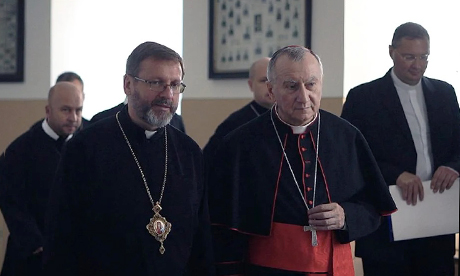The Vatican Secretary of State said that it is not too late for peace negotiations between Russia and Ukraine, and that the Holy See is willing to mediate between the two warring parties.
Cardinal Pietro Parolin said the Vatican is “willing to facilitate dialogue with Russia” and “ready to help” all parties involved to return to the negotiating table.
“There is still time for goodwill, there is still room for negotiation,” the cardinal said in an interview published jointly by several Italian newspapers.
In the interview, published on February 28, the secretary of state said that despite the outbreak of conflict “I am convinced that there is still and always room for negotiation. It is never too late”.
“Because the only reasonable and constructive way to settle differences is dialogue, as the pope never tires of repeating,” he said.
“The Holy See, which in recent years has followed the events in Ukraine constantly, discreetly and with great attention, offering its willingness to facilitate dialogue with Russia, is always ready to help the parties to resume that path”.
Russian and Ukrainian representatives arrived for talks on Monday at the Ukraine-Belarus border. However, Ukrainian representatives voiced scepticism that the talks will end the conflict.
But “we must avoid every escalation, halt the conflict and negotiate,” Parolin said. He also looked to longer-term implications between East and West. The cardinal commented that “returning to a new cold war” is a “disturbing scenario” and that only “a culture of fraternity” can build stable and just world peace.
The cardinal acknowledged the danger facing Europe and the eerie echoes of the world wars. European intervention in the Ukrainian conflict “would be a catastrophe of massive proportions” he said. Still, the eventuality “cannot be excluded”.
“I have seen some of the statements these days that recalled the incidents that preceded and provoked the Second World War” Parolin said. “These references make one shudder”.
He added that the different Christian communions can also “play a vital role” in bringing peace.
“Today we see encouraging signs in the appeals of the heads of the Orthodox Churches who show a willingness to leave aside the memory of each other’s wounds and to work together for peace” he commented.
Since the launch of the full-scale invasion of Ukraine on February 24, Pope Francis has engaged in behind-the-scenes efforts to help end the conflict.
On February 25, in an unprecedented move, he visited the Russian Embassy to the Holy See “to show his concern for the war”. Insiders say the visit included a direct phone call to Vladimir Putin.
On the same day, Pope Francis called Major Archbishop Sviatoslav Shevchuk, the Ukrainian Greek Catholic Church leader. The pope promised to do everything he could to help end the war. This was the genesis of the idea that the Vatican could mediate between Ukraine and Russia.
Sources
Additional readingNews category: Palmerston, World.




